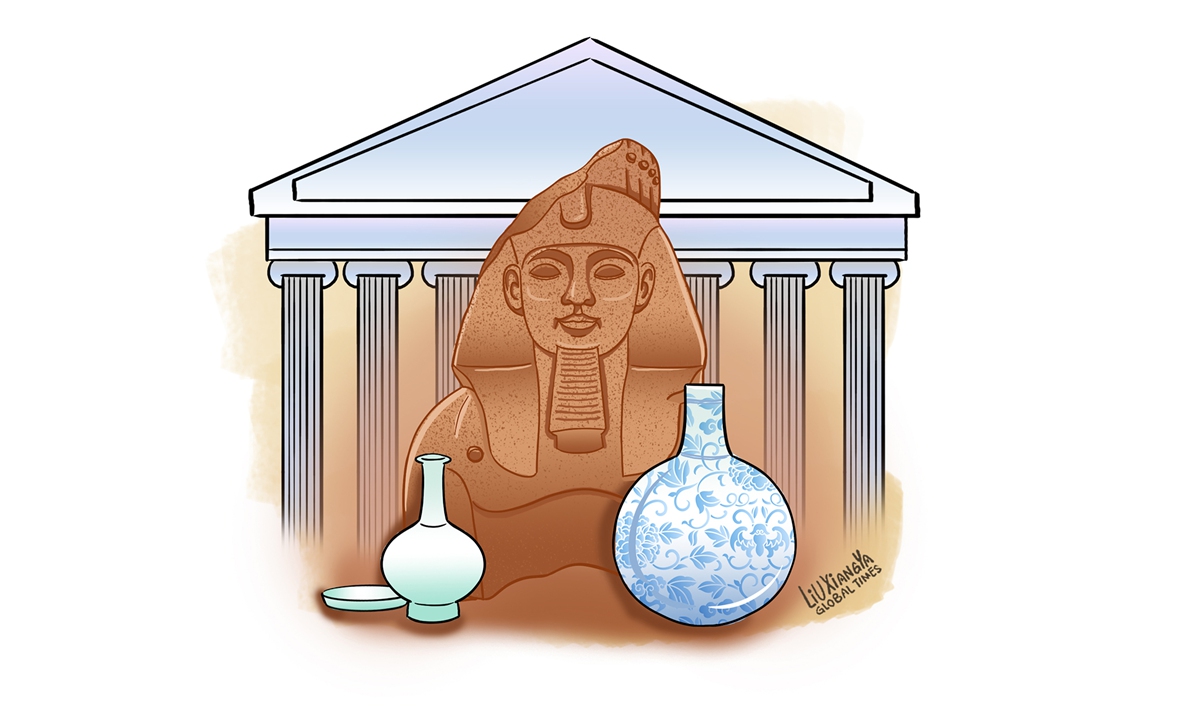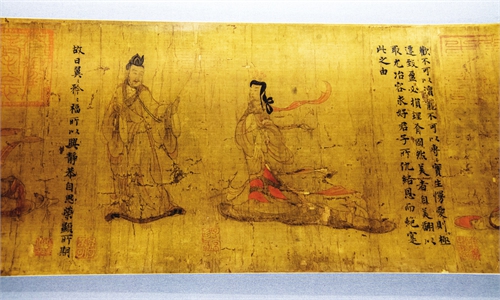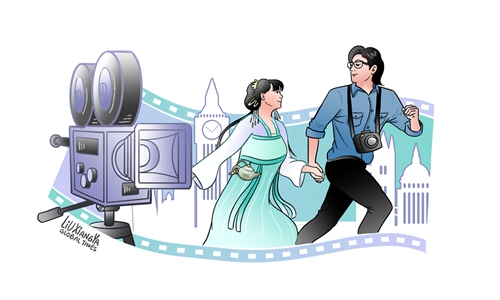ARTS / CULTURE & LEISURE
Egyptian footballer inspires to reclaim ancestors’ antiquities
Mohamed Salah inspires Egyptians to reclaim their antiquities

Illustration: Liu Xiangya/Global Times
Earlier this month, Egyptian soccer player and Liverpool star Mohamed Salah posted a photograph of himself with an ancient Egyptian statue on display at the British Museum in London. The museum showcases around 110,000 ancient Egyptian artifacts, not forgetting a total of approximately 200,000 Egyptian artifacts exhibited at different museums around Britain.
The statue Salah took the photograph with was Ramesses II's, and it weighs 10 tons. This popular photograph which was trending on social media actually made me sad and bitter. It made me wonder why Egyptians have not reclaimed some of their antiquities yet. It seems like Salah wanted to send us a message saying, "Egyptians, let us work harder toward reclaiming our ancestors' history. Let us support the Egyptian government's remarkable efforts to reclaim our antiquities."
Not only does the British Museum own Egyptian antiquities, but other museums in many countries of the world do as well. Those artifacts left the country in different ways. At the Louvre, there are 50,000 Egyptian artifacts; 14,000 at the National Archaeological Museum of Florence; 32,000 at the Turin Museum in Italy; 26,000 at the Metropolitan Museum in the US; 25,000 at the Royal Ontario Museum in Toronto, Canada; and 12,000 at the Museum of Art History in Vienna, Austria. Egyptian antiquities attract millions of tourists every year, and those countries make millions of dollars out of their visits. These museums do not only exhibit stolen antiquities, but also profit from looting and robbery, which is truly appalling.
I am not against cooperation between international museums, where artifacts are displayed from different countries, but only for a specific period, then they are returned to their countries of origin. In fact, I believe that such work is a good way to promote tourism. One of my non-Egyptian friends once told me that when he visited the Egyptian section at a museum abroad he saw the greatness of Egyptian antiquities and, in turn, was inspired to travel to Luxor, the city where a third of the world's antiquities is found. I completely oppose looting and robbing antiquities and refusing to repatriate them to their countries of origin.
We have a right to these artifacts; we should never give up on them. As Arabs, we say "If you demand your rights, they will never be lost."
Egyptian law criminalizes the robbery and sale of antiquities. The first decree governing the management of antiquities was issued in 1835. During the reign of Mohammed Ali Pasha, the founder of modern Egypt, the first museum was built. In 1912, law No.14 was passed. The first fully fledged law in the modern sense, it aims at protecting antiquities. In 1951, law No.215 was also passed to establish proper procedures to quash the illegal trade of antiquities. In 2010, law No.3 was issued, which fully criminalizes the trade, sale and purchase of antiquities. Egyptian law prohibits giving away antiquities as gifts as well as their sale and purchase. Egyptian antiquities used to be given away as gifts before law No.117 was passed in 1983, and all what was needed was issuing an official certificate called a "certificate of exportation."
The Egyptian government has exerted relentless efforts to repatriate Egyptian artifacts, and those efforts have paid off: Thousands of pieces have been returned to the homeland.
However, some famous items have not been returned until today, such as Nefertiti's Bust, the Rossetta Stone, the Dendera Temple zodiac and the world's oldest linen dress, the Tarkhan dress. Nefertiti's Bust is, in fact, a global symbol of feminine beauty and power. The statue was found by the German archaeologist Ludwig Borchardt and his archaeological team on December 6, 1912. The famous Egyptian Egyptologist Dr. Zahi Hawass added in relation to this that the statue left Egypt through the deceitful and evasive conduct of Borchardt. Borchardt falsely wrote in the division protocol and the excavation report concerning the newly found artifacts that Nefertiti's Bust is made of gypsum attributing it to unnamed royalty despite his adequate knowledge that the statue is made of limestone. Borchardt intentionally deceived Egyptian authorities to let Germany keep the statue.
The Rossetta Stone is already known to every single Egyptian. I still recollect my history lesson in primary school talking about the iconic artifact. We learned that the Rossetta Stone was a royal decree issued in memory of Egypt's ruler Ptolemy V. It was written by the clergy for the wider public, the Egyptian elites and the ruling class. Its text is written in two languages and three scripts: hieroglyphic, the official language of ancient Egypt; demotic, the popular language for written documents in ancient Egypt; and ancient Greek, the language of the ruling class at the time. The slab was discovered in 1799 by a French soldier named Pierre Bouchard during the Napolean Bonaparte expedition to Egypt.
I wish I had been able to see these unique artifacts and indulge in their beauty. Queen Nefertiti was famed for her beauty, and she is considered one of the influential women who played a pivotal role in the history of ancient Egypt.
In recent years, Egypt has doubled efforts to repatriate stolen Egyptian artifacts. The Egyptian Supreme Council of Antiquities has demanded the return of the ancient Egyptian artifacts on display in Western museums. Zahi Hawass has previously asked the Egyptian public to sign a petition in Arabic and English on his personal website with the aim of collecting 100, 000 signatures, and, consequently, travel to the UK to demand the return of the Rossetta Stone. May the photographs captured by Mohamed Salah near the ancient Egyptian statue in the British Museum act as the spark that inflames Egyptians' passion in their struggle to repatriate the possessions of their ancestors.
Egyptian artifacts narrate the history of Egyptians who have been struggling and fighting for more than 7,000 years, and nobody has any claim over them. These were entrusted to us by our forefathers, so we must keep them safe.
Egypt is my homeland, and I am proud of its history and artifacts, but China is my second home. I love it and feel connected to it through many good memories. China's artifacts have always been able to instill in me a sense of astonishment at their beauty and magnificence. I feel that I have been very lucky to frequent many of the tourist attractions in China where I felt the splendor and grandeur of Chinese artifacts.
As a matter of fact, words fail to capture the extent of my admiration for Chinese ceramics. The last time I was in China, I bought many vases and ceramic products that mimic some of China's most iconic artifacts, which I brought all with me to Egypt to decorate my home. Chinese ceramics are globally renowned for their splendor and beauty. Muslim potters recognized the merits of Chinese pottery and attempted to replicate them. Original Chinese ceramics have been found in the Egyptian city of Fustat side by side with other ceramics created by Egyptian potters to resemble Chinese ceramics.
Everyone has the right to indulge in the beauty of Chinese ceramics, but nobody is entitled to revel in the beauty of an object one has no claim over in the first place. I am disheartened that many Chinese ceramics are exhibited at the British Museum to this day, along with other artifacts that include paintings, jade and bronze objects. Repatriating stolen artifacts is an important issue that has animated public opinion in China. Recently, many voices have demanded that the British Museum return the Chinese artifacts in its collection.
It seems that Egypt and China are both in the same boat, united by a common cause. Both are in need of more cooperation and solidarity to prevail in their struggle to repatriate their artifacts. There are numerous milestones in Chinese-Egyptian relations that demonstrate the strength of the bonds between the two countries. Egypt's joining the BRICS will definitely further the friendship and cooperation between the two countries.
I still remember the "Go China" (zhongguo jiayou) Egyptians chanted when they formed grassroots campaigns to show their solidarity with China and its fight against COVID-19. China has succeeded in its battle against the pandemic, and it also lent Egypt a hand when the pandemic spread over there. We now need to say: "Go Egypt and China in your battle to repatriate your artifacts."
Yara Ismail is a lecturer at Cairo University, Egypt. life@globaltimes.com.cn


